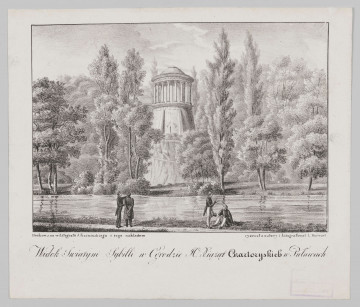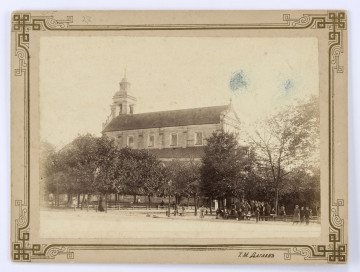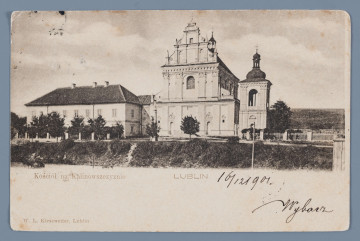
View of the Temple of Sibyl in the Garden of the Czartoryski Princes in Puławy
1828
National Museum in Lublin
Part of the collection: Lubliniana. Painting views of Lublin and the Lublin Region (17th–early 20th c.)
The palace chapel, founded by Prince Adam Kazimierz Czartoryski, used as a parish church from 1919, commonly called the church “on the hill”, was designed by Chrystian Piotr Aigner with the participation of decorator Frederick Bauman. The building was erected in the years 1800-1803, and the bell tower was built next to it, also in the early nineteenth century.
Both buildings were located on the northwestern edge of a hill sloping down towards the Vistula River, near the former Lublin track leading to Radom. Stone terraces ran up the slope to the chapel from the side of the road, while a magnificent four-row linden avenue, the traces of which have survived to this day, led to it from the palace and park complex. Prince Adam Kazimierz dedicated the chapel to the memory of his mother, Maria Zofia nee Sieniawska. The classicist building with an ideal form of a rotunda modelled on a Roman temple was probably intended to serve as the family chapel and a kind of pantheon of the Czartoryski family glory, emphasising the family's merits.
The prince's intention to turn the building into a family mausoleum is evidenced by, among others, niches in the interior, where tombstones could have been placed. However, they were never placed there because until the outbreak of the November Uprising all of the founder's relatives were alive and after they left Puławy it was not possible to bury them in the chapel. Only the heart of Prince Adam Kazimierz, who died in Sieniawa in 1823, was placed in a niche behind the altar, equipped with an iron grate, behind a glass door with a lock, in a very ornate silver ashtray. It was still there in 1830 (in 1853 the urn with the heart was no longer in the hiding place).
The original furnishings of the temple were supplemented in 1882, when neo-Gothic confessionals, pews and an altar were transferred from the former Catholic palace chapel of the Maryjski Institute, replacing the earlier marble one.
A figural scene depicting a marketplace completes the view. According to the decision issued in 1811 by the Duke of Warsaw Frederick August III Puławy had the right to organize ten fairs per year.
Renata Bartnik
Author / creator
Dimensions
cały obiekt: height: 49 cm, width: 34,5 cm
Object type
graphics
Technique
aquatint
Material
paper
Creation time / dating
Creation / finding place
Owner
The National Museum in Lublin
Identification number
Location / status

1828
National Museum in Lublin

1890 — 1910
National Museum in Lublin

1899 — 1901
National Museum in Lublin
DISCOVER this TOPIC
National Museum in Szczecin
DISCOVER this PATH
Educational path